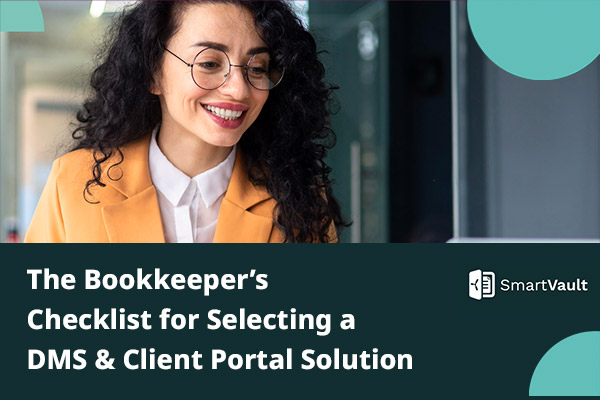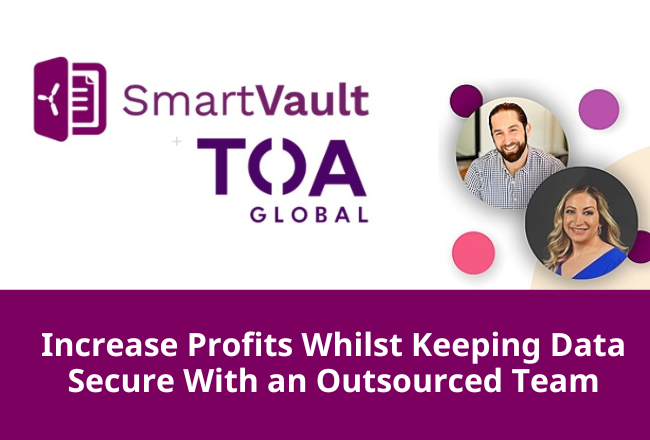
Enhance Your Workflow with Client Portals
Intuit® recently made the decision to sunset its current DMS offering, in favor of partnering with SmartVault and offering a connected service that extends the capabilities of the Lacerte® and ProSeries® desktop to deliver more robust document management capabilities, as well as a fully integrated, secure client portal to share files with clients. Known as SmartVault for Intuit Lacerte and SmartVault for Intuit ProSeries, the pairing of these technologies fully automates tax preparation workflow, from receiving source files securely from clients to printing and sharing final tax returns with SmartVault’s built-in custom branded client portal.
Naturally, accountants using Lacerte and ProSeries will have questions about this new integration and how their firms and clients can get the most out of working in the cloud.
As the growth of cloud applications continues to skyrocket, the word “cloud” finds itself in nearly every conversation regarding technology advancements and improved business efficiencies. Virtually every business today is leveraging cloud-based services in some shape or form, including having a customer-facing website and using online banking.
As you evaluate your own business and ways to better serve your clients, it’s important to understand how you can use cloud-based services to drive efficiencies, improve your security and compliance posture, and improve the “stickiness” of your clients. If your clients are not yet demanding that you start working with them through the cloud, they soon will be.
Where the SMB Goes, So Go Their Service Providers
Businesses are growing, and the most successful ones are leveraging cloud services, mobile apps, social networking and analytics to fuel growth and efficiencies in their business. The latest research, Parallels SMB Cloud Insights, states that small- and medium-size businesses (SMBs) use an average of five cloud services, and that number is expected to grow to an average of nine services by 2016. The business application category, alone, saw a 60% growth in cloud adoption, with instant collaboration, file sharing and online accounting taking the top three spots.
Your clients are already experiencing the benefits of cloud technology in their business, and will drive more collaboration with their accounting partners to deliver anytime, anywhere access to financial data and documents.
It’s a new era in the accounting profession, where automation and integration drive highly efficient and automated workflows, and support higher-value advisory services. Today’s progressive firms are offering clients full-scale business advisory services that allow them to lead their clients to more efficient business processes, guided by comprehensive, real-time financial insight. As a trusted advisor to clients, practitioners also need to lead by example by operating at peak efficiency in their own practices. Today’s “new-era” firms are doing just that.
The adoption of cloud technologies has helped accelerate operational efficiencies in all aspects of the accounting professional’s workflow. Accounting professionals who understand the value of a more efficient workflow know that they can:
- increase productivity and efficiency;
- move away from high-transaction to higher-value services;
- gain a competitive advantage over firms that are reluctant to evolve their processes; and
- work smarter and cut costs, all without having to cut fees.
Document Management: A Connected Service That can Deliver Massive Efficiencies
Big strides have been made in the profession in the way of improving operational efficiencies, and a major part of this transition has been in document management, specifically in storing, managing and sharing files as part of the accountants daily workflow. One of the most significant shifts is for firms to adopt a paperless workflow, converting documents immediately from paper to digital files. From there, the profession witnessed an explosion of software-as-a-service applications that delivered anytime, anywhere access to data and files, while also adding professional security management as part of the overall business process – a critical process if you are involved in the chain of command, dealing with documents that contain sensitive or confidential information.
An integrated, online document storage service can benefit accountants by doing all of the following:
- Reducing cost and manual tasks by adopting an end-to-end paperless workflow.
- Increasing staff efficiencies with access to files anytime and from any device.
- Improving overall serviceability to clients by providing ‘anytime’ access to their files.
- Having a built-in disaster recovery plan; data and documents are backed up and stored offsite.
- Lowering software, hardware, maintenance and management costs; service updates are performed by the developer, not by in-house staff.
- Improving security management with trained staff, world-class datacenters with state-of-the-art power, ventilation and security features, as well as encryption and security protocols to ensure the safety of your data.
Integration Propels the Profession Further Forward
The next major step forward for the accounting profession was the advent of the open platform. In simple terms, this allows new features and capabilities to be seamlessly plugged into other applications, adding functionality and enhancing workflows.
For example, SmartVault initially found its place in the profession by integrating its online document storage service into accounting applications. The first shipping integration was with QuickBooks® desktop, followed by QuickBooks Online and other online accounting applications. The integration is simple, yet robust enough to allow accounting professionals to use the patented SmartVault Toolbar to easily upload, share and access source files directly from transactions in QuickBooks. This improved workflows for client bookkeeping and client accounting services providers.
Another good example of SmartVault as a connected service to a desktop application is the recent integration between SmartVault and Lacerte and ProSeries, as stated at the beginning of this article. With this integration, accounting firms benefit from:
- Robust online document storage capabilities built in to Lacerte and ProSeries.
- An integrated client portal that can be custom branded for securely sharing tax returns and other documents with clients, which further enhances the client-accountant relationship.
- Easy setup using existing client data and templates to automatically set up users, security permissions and folder structure for each client.
- Batch email functionality using customizable email templates.
- Audit reports to track employee and client activity.
- Automated email alerts to notify when files have been uploaded or viewed.
- All the benefits of cloud storage, such as continuous offsite backup of documents, mobile access, and professional security monitoring and management.
Technology Enhances the Client Relationship; It Doesn’t Replace It
My team and I talk to hundreds of accounting firms each week, with some partners expressing fears that implementing technology will somehow replace the human interaction they enjoy now with their clients – and that some of their clients expect. Technology isn’t, and shouldn’t, replace those engagements, but with technology, you have the choice of how best to serve your clients.
For example, if you want your clients to come into the office to review and pick up their tax return, then by all means, continue doing that! But, you can still use your client portal to provide your clients access to their return anytime they need it after they’ve left your office, providing not only a meaningful face-to-face engagement, but also extending the value of your service to your clients. On the flip side, you can leverage a client portal to automate the distribution of 50, 500 or 5,000 tax returns securely to your clients in a few easy steps.
Technology delivers choices! You decide how you want to usher in your own era of business efficiencies and higher-value services to your clients.




